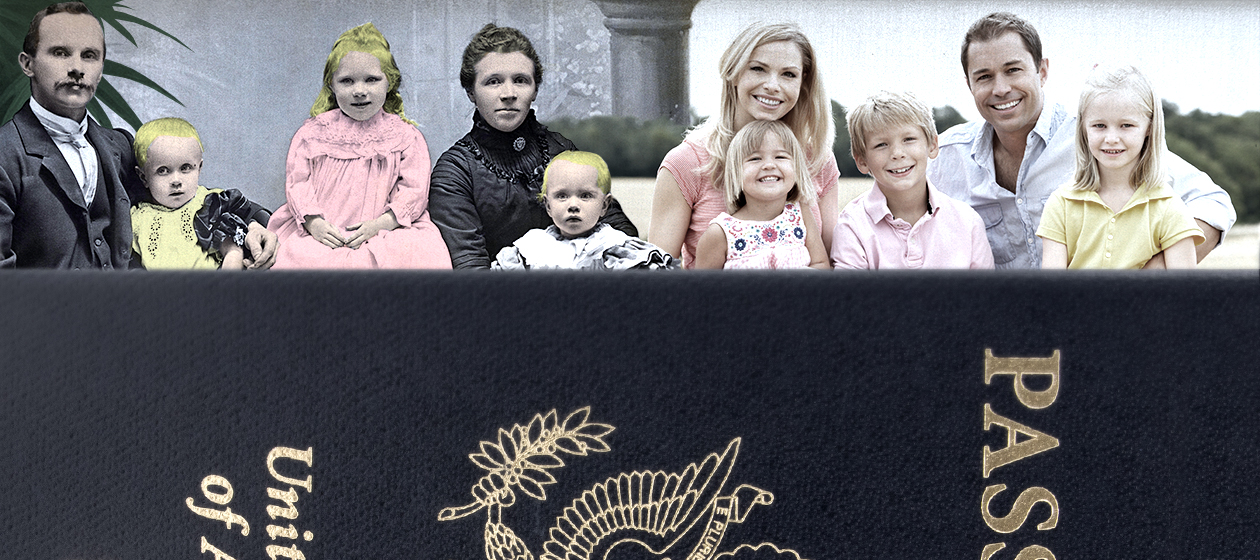Citizenship is the new caste system
The circumstances of your birth have never been more important


A free daily email with the biggest news stories of the day – and the best features from TheWeek.com
You are now subscribed
Your newsletter sign-up was successful
Lord Salisbury, one of England's great conservative leaders, was an unapologetic snob. Looking out over the European landscape in 1862, he saw that the aristocracy was collapsing, and this seemed to him like a catastrophe for all of civilization. How, he wondered, could common morals and high culture be maintained without the support of patricians? Who would govern when no one had been groomed for leadership? What chaos might ensue in a world where people had no clear sense of their proper roles and obligations? "Political equality is not merely a folly — it is a chimera," he concluded. "It is idle to discuss whether it ought to exist; for, as a matter of fact, it never does."
Americans read these complaints and scoff. We like to think we've transcended this kind elitism. Here in America, we prioritize content of character, not circumstances of birth. In this country, your fortunes depend on what you can do, not on some inherited pedigree.
That, at any rate, is our national myth. Unfortunately, it's not really true, in this nation or any other. Democratic ideals may have swept the globe so totally that even totalitarians now pay lip-service to them, yet our world is in some respects more ruthlessly class-divided than ever. I'm not talking here about the 1 percent, or the 9.9 percent, or whatever percentage we see as inheriting systemic advantages from their well-heeled parents. I'm talking about citizenship.
The Week
Escape your echo chamber. Get the facts behind the news, plus analysis from multiple perspectives.

Sign up for The Week's Free Newsletters
From our morning news briefing to a weekly Good News Newsletter, get the best of The Week delivered directly to your inbox.
From our morning news briefing to a weekly Good News Newsletter, get the best of The Week delivered directly to your inbox.
Citizenship represents the most significant class lottery remaining in the modern world. The cover of your passport speaks volumes about your prospects for enjoying peace, prosperity, and happiness over the course of your life. If you are the offspring of Danes, you can likely look forward to eight peaceful and happy decades, with a good education and quality medical care. Were you born in Haiti? In that case, you may get 65 years, but you'll probably spend them coping with grinding poverty (at about 1/30th the income of an average American). If you were born in North Korea, accept my compliments for even managing to read these words.
Citizenship, in short, is massively consequential, and there's almost nothing meritorious about it. If you've spent your life as an American citizen, your fortunes have depended to a very great extent on an inherited pedigree. Even if you're brilliant and full of entrepreneurial energy, those qualities probably wouldn't have helped you as a citizen of Burundi or Niger. It's hard to pull yourself up by the bootstraps when there's virtually nowhere to go.
Western nations are developing a bad conscience about this system. Thanks to advances in technology, we now know what's happening in Syria and Sudan, and our planet has become so interconnected that it now seems irresponsible to wash our hands of failed states (and their suffering citizens). Even as the globe contracts though, we're losing confidence in our ability to improve terrible places. A quarter-century ago, there was still considerable optimism in the West about the potential for democracy and free enterprise to "lift all the boats," inspiring impoverished nations to transform themselves into prosperous, free societies. In fact, free enterprise has done much to alleviate material need around the world, and even very poor countries have in some cases seen significant improvements in their standards of living. Corrupt government, though, has proved a harder nut to crack. Stability, prosperity, and political freedom seem to arise out of a complex mix of factors that, where absent, are difficult to replicate. The upshot is that truly miserable places may not improve anytime soon.
Where governments fail to secure order and protect human rights, who can blame their citizens for wanting to leave? Unfortunately, that may not really be an option for some people, thanks to the dominating role of citizenship in today's world order. If you're poor and lacking rarified skills, other countries probably don't want you. The truly desperate or determined may try to migrate anyway, at which point Western nations are faced with a choice: How far are we willing to go to maintain these class lines?
A free daily email with the biggest news stories of the day – and the best features from TheWeek.com
This isn't the first time we've stood at such a juncture. In the late 19th century, as class lines were being obliterated all across Europe, a number of aristocrats rose up to make spirited defenses of traditional class division. Lord Salisbury's Disintegration and Tennyson's Locksley Hall Sixty Years After stand as two of the more eloquent reflections on this topic. These men saw the collapse of aristocracy as a disaster, and Americans might be surprised to find that they actually make some rather strong points. Salisbury in particular was admirably free of any romantic notions about the intrinsic superiority of the nobly-born. He simply regarded class distinction as a necessary component of a civilized social order. Without defined social roles and a cultivated leisure class, society would fragment and culture would coarsen. Responsible leadership would be buried under the ruthless logic of the political machine. The future would be written by demagogues, skilled only in the art of stoking fears and channeling popular resentment.
Looking at modern society, can we really say that these fears were ill-founded? Do we not have problems today with social fragmentation, a debased civic culture, and hysterical populist politics? Among the European powers, Great Britain was perhaps the most successful in transitioning smoothly from an aristocratic order to a modern, democratic one. There were no major coups, uprisings, or experiments with totalitarianism. Despite that, it seems unlikely that men like Tennyson or Salisbury would withdraw their complaints, given a glimpse of 21st century England. They were right to see that the dissolution of the old social order would precipitate a host of new problems. They were also right to see that the transition was inevitable. A rigid class system simply can't be maintained once common consensus has deemed it morally unacceptable.
Is the Western world reaching that point, with respect to immigration and citizenship? It's not clear, but there are interesting signs that we may be moving in that direction. Opposition to migration has been the single most defining feature of right-wing populist movements, both in America and across Europe. At best though, these movements have commanded a very slight majority of public opinion, and their more stringent efforts to crack down on immigration have provoked serious backlash. Italian populists were excoriated this month for their refusal to accept a rescue vessel bearing hundreds of migrants. President Trump's "zero-tolerance" immigration policies drew criticism even from evangelical leaders who have been his staunchest supporters. Permissive immigration policies and porous borders carry obvious social costs, but nevertheless, it appears that Westerners are becoming morally uncomfortable with rigid efforts to maintain a citizenship regime that looks increasingly like a global caste system.
What are the alternatives? In the coming years, that question will need to be explored in more detail. Would a lengthier and more involved naturalization process help us to balance the various conflicting goods? Might we end up with a situation reminiscent of Ancient Rome, wherein different "tiers" of citizens live together in common cities? Perhaps Western nations will explore new methods of cooperation, enabling them to present migrants with a range of livable options. (Even if you can't live here, perhaps we can help you to move somewhere so that your family can have a clean start.)
Only one thing is certain: Immigration will be a source of heated controversy for many years to come. It forces us to confront old problems in a new guise. What benefits should parents be permitted to bequeath to their children? How can we preserve communities without being unjust to the people who stand outside of them? At what point does communal solidarity bleed into xenophobia, racism, and tribal hatred?
We've grappled with these questions before. It's time to craft new answers.
Rachel Lu is a writer based in Roseville, Minnesota. Her work has appeared in many publications, including National Review, The American Conservative, America Magazine, and The Federalist. She previously worked as an academic philosopher, and is a Robert Novak Journalism Fellow.
-
 Epstein files topple law CEO, roil UK government
Epstein files topple law CEO, roil UK governmentSpeed Read Peter Mandelson, Britain’s former ambassador to the US, is caught up in the scandal
-
 Iran and US prepare to meet after skirmishes
Iran and US prepare to meet after skirmishesSpeed Read The incident comes amid heightened tensions in the Middle East
-
 Israel retrieves final hostage’s body from Gaza
Israel retrieves final hostage’s body from GazaSpeed Read The 24-year-old police officer was killed during the initial Hamas attack
-
 China’s Xi targets top general in growing purge
China’s Xi targets top general in growing purgeSpeed Read Zhang Youxia is being investigated over ‘grave violations’ of the law
-
 Panama and Canada are negotiating over a crucial copper mine
Panama and Canada are negotiating over a crucial copper mineIn the Spotlight Panama is set to make a final decision on the mine this summer
-
 Why Greenland’s natural resources are nearly impossible to mine
Why Greenland’s natural resources are nearly impossible to mineThe Explainer The country’s natural landscape makes the task extremely difficult
-
 Iran cuts internet as protests escalate
Iran cuts internet as protests escalateSpeed Reada Government buildings across the country have been set on fire
-
 US nabs ‘shadow’ tanker claimed by Russia
US nabs ‘shadow’ tanker claimed by RussiaSpeed Read The ship was one of two vessels seized by the US military



